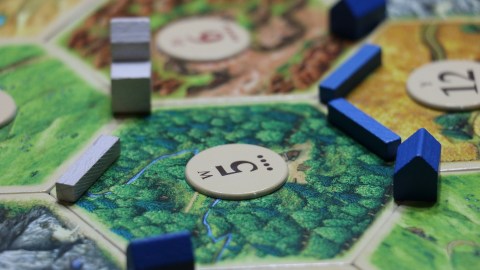7 (more) board games to help kids think big

- The number of board games being released each year is unprecedented.
- Among the deluge of new and interesting titles, many can help develop life-critical skills, such as creativity, problem solving, and lateral thinking.
- We look at seven more board games that help teach children to think big.
We are living in a board game renaissance. Where once families had a paltry selection of dice rollers to choose from, today the shelves of toy stores and hobby shops buckle under the weight of fun and absorbing board games. Tucked among those variegated boxes are fantastic learning experiences that educate and entertain children in equal measure.
Last time, we cataloged seven of the best board games to teach children STEM, strategy, and executive functions. But that barely scratched the surface, so we’re back with seven more.
The rules are the same. Every game must support a family-friendly four players, so classics like Go and Chess will be truant again despite their cognitive-expanding capabilities. Also, a ten-year-old should be able to comprehend the game’s mechanics after a game or two, meaning stat-laden behemoths like Scythe and Terraforming Mars—though wonderful in their own right—will need to find their dues on another list.
Ticket to Ride
In Ticket to Ride, players transform into 19th-century tycoons bidding to monopolize the burgeoning railroad industry. They collect cards of various colors and use them to purchase tracks. Connecting these tracks with major railway hubs, they create routes crisscrossing the continental United States. Longer routes earn more points, with additional points awarded to players who complete special Destination routes.
Though easy to learn, the game hides enough strategic depth to earn it the 2004 Spiel des Jahres. Players must use spatial reasoning to plan their routes, understand the risk-reward between collecting more cards versus claiming routes, and adapt their strategies to an ever-changing board.
The game also introduces children to basic U.S. geography, helping them understand the relationship between major U.S. cities. Though, the map isn’t 100 percent accurate (as any citizen of Duluth, Minnesota, will tell you). Other versions of the game sport maps for Asia, Europe, the Nordic Countries, and the United Kingdom.
Dixit
Many board games recognize only cold calculations and cutthroat planning. Dixit, the 2010 Spiel des Jahres winner, takes a different tack by rewarding players for their creativity and a strong theory of mind.
Each round, one player becomes the storyteller. This player plays a card from their hand face down and offers a clue to describe it. The other players then place cards they think match the clue. After a good shuffle, the cards are revealed, and everyone tries to figure out which card was the storyteller’s.
Here’s the trick: To maximize points, the storyteller wants only some players to guess the correct card. If everyone guesses correctly, they lose the round.
To galvanize players’ imaginations, Dixit’s cards depict fantastical scenes in a surrealist art style. Think a boy on a ladder fashioning clouds into animals, biomes collected in raindrops, or a cenotaph imprinted with a blood-red snake. And because everyone’s creativity is unique, each grouping of friends and family will result in wildly different experiences.
Labyrinth
Labyrinth asks players to navigate a maze to find a treasure buried in its depths. Simple enough, except the maze morphs at the will and whim of your competitors.
Players take turns sliding an extra piece into the rows and columns of the maze, altering the passageways available to the players. The extra tile then passes to the next player, who alters the maze further. The first player to retrieve all their treasures and get out wins.
A pure puzzle-solving game, Labyrinth presents players with spatial and strategic challenges. Do they use their turn to block an opponent’s path or try to shift the wall blocking their own? Though each move is simple, it’s the chain of effect that makes the game challenging and fun.
Forbidden Desert
Where most games require players to defeat each other to claim victory, Forbidden Desert asks them to work together against the game itself.
Players must discover a legendary flying machine in the titular desert. Each one embodies a role that grants them a special skill, and as a team, they must explore the desert to discover the far-flung pieces of the flying machine.
To succeed, everyone must coordinate their actions, efforts, and equipment before they die of thirst or the shifting desert sands bury them forever. And should one player fail, everybody loses.
A Mensa Select Winner, Forbidden Desert is one of the best games out there to develop children’s cooperative and team-building skills. Its predecessor, Forbidden Island, is worth a look, too.
Wingspan
The board game world overflows with fantasy and science fiction settings that cast players as the conquerors of eccentric lands. Wingspan takes place in a wildlife preserve for birds. Not even thunderbirds or phoenixes, but run-of-the-mill blue jays and sparrows. And it is pure joy.
Players cultivate a wildlife preserve to attract and support different bird species. Through the game’s card-drafting and hand-management mechanics, they’ll have to keep the species fed and aid in their procreation. In turn, the birds affect the habitat in combinations that assist the player’s efforts.
Players learn strategy, resource management, and gain an understanding of ecological conservation, but the game’s real educational draw is as an introduction to birds. The game includes 170 unique North American species cards, each beautifully illustrated to look painted by John James Audubon himself.
Cytosis
The world of cells is a weird and bewildering place. It doesn’t help that the cellular structures and functions come wrapped in hazy terminology. Enter Cytosis, a worker placement game that takes place inside the human cell.
Players place workers on organelles to tap into the cell’s biological processes. These processes allow players to amass enzymes, hormones, and receptors, which are in turn converted into health points. The healthiest player wins the game.
Cytosis does a good job of personalizing the cellular life cycle through gameplay. It introduces players to organelles like the Golgi apparatus and endoplasmic reticulum and familiarizes them with cellular resources like ATP and mRNA, as well as the processes that manifest them.
While players won’t be able to write a dissertation after a game, they will find the concepts far less intimidating. And it’s also a solidly fun worker placement game to boot.
Dominion
Few games enjoy the pedigree of Dominion. The game won all the awards and honors of 2009—among its golden trove the Spiel des Jahres and a Mensa Select—and for good reason. Through its deck-building mechanics, the game teaches strategy, resource management, problem-solving, lateral thinking, and the principles of cost-effectiveness.
Players become monarchs aiming to expand their kingdoms through territorial claims. To do so, they must deepen their provincial coffers by collecting treasure cards and enhance their economic prowess through kingdom cards. Kingdom cards offer players unique moves that, if properly paired together, can increase a deck’s efficiency and purchasing power.
Like Settlers of Catan, Dominion enjoys near infinite replayability as each game can populate the field with a unique combination of kingdom cards. As such, players can’t rely on the same tactics to see them to victory. They must instead learn core strategic principles and then adapt to the resources available. They must also learn to balance purchasing power and victory conditions with deck efficiency to seize those beguiling estate, duchy, province cards before others.
What to play next?
These board games will be a welcome addition to any family’s Saturday night, but with more excellent games coming out every year, this list is hardly comprehensive.
If you’re looking for something new, be sure to research past award winners and visit board game websites like BoardGameGeek. Board games can be expensive, so try to find a local hobby shop that has demonstration events or store copies to try before you buy.
With these tips, it won’t be difficult to find a board game that teaches your child something new. As a bonus, it’s also a great way to facilitate fun family time.





